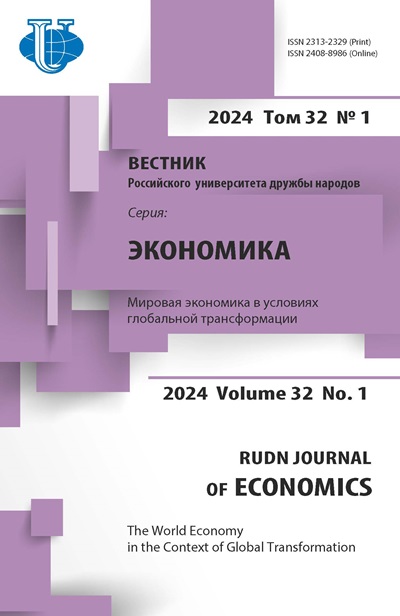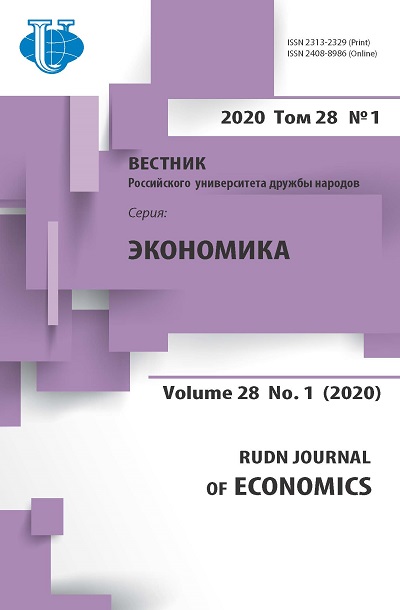Educational migration: factors influencing the attraction of foreign young scientists and the return of Russian young scientists
- Authors: Belov F.D.1
-
Affiliations:
- The Russian Research Institute of Economics, Politics and Law in Science and Technology
- Issue: Vol 28, No 1 (2020)
- Pages: 184-195
- Section: INTERNATIONAL LABOR MARKET AND INTERNATIONAL MIGRATION
- URL: https://journals.rudn.ru/economics/article/view/23503
- DOI: https://doi.org/10.22363/2313-2329-2020-28-1-184-195
Cite item
Full Text
Abstract
The article highlights the problem of the emigration of young scientists and students from Russia abroad. The factors affecting the retention of foreign students in the country after graduation are presented, as well as the return of Russian students after receiving higher education abroad. The experience of foreign states in stimulating educational immigration has been analyzed, in particular, scientific programs have been considered to attract foreign students for the purpose of studying in higher education institutions. Similarly, scientific, industrial and economic benefits are singled out in the article with the accumulation of intellectual capital in the country. The options for managing intellectual capital are considered, for example, the idea of creating scientific centers on the basis of coworking as an effective method for attracting and engaging young scientists for achieving high scientific results is proposed.
About the authors
Filipp D. Belov
The Russian Research Institute of Economics, Politics and Law in Science and Technology
Author for correspondence.
Email: belov@riep.ru
PhD, researcher
20A Dobrolubova St., Moscow, 127254, Russian FederationReferences
- Agarkov, G.A., & Koksharov, V.A. (2018). Data mining algorithms for modeling international scientific migration. International Conference of Computational Methods in Sciences and Engineering 2018, ICCMSE 2018, 2040. American Institute of Physics Inc. https://doi.org/10.1063/1.5079103
- Azarnert, L.V. (2019). Migration, congestion, and growth. Macroeconomic dynamics, 23(8), 3035–3064.
- Belov, F.D. (2010). Intellektual'naja jemigracija iz Rossii: social'no-jekonomicheskie posledstvija i podhody k regulirovaniju [Intellectual emigration from Russia: social-economic consequences and approaches to regulation] (Dissertation of the Candidate of Economic Sciences). Moscow: RUDN University. (In Russ.)
- Beverelli, C., & Orefice, G. Migration deflection: The role of Preferential Trade Agreements. Regional science and urban economics, 79(C), 103469. https://doi.org/10.1016/ j.regsciurbeco.2019.103469
- Biavaschi, C., Burzynski, M., Elsner, B., & Machado, J. (2018). Taking the skill bias out of global migration. SSRN Electronic Journal, 1–73.
- Bondarenko, M. (2018). Jeksperty RANHiGS rasskazali ob usilivshejsja utechke mozgov iz Rossii [Experts of RANEPA told about the increasing of the brain movement from Russia]. RBK. Retrieved from https://www.rbc.ru/society/23/01/2018/5a673f129a79471 2579d7dbe (accessed: 30.09.2019). (In Russ.)
- Chen, L.L. (2014). Scientific migration of junior scientists to China. Genome biology, 15, 119. https://doi.org/10.1186/gb4180
- Federal'naja sluzhba gosudarstvennoj statistiki [Federal State Statistic Service]: official website. Retrieved from http://www.gks.ru/wps/wcm/connect/rosstat_main/rosstat/ru/statistics/ population/demography/
- Global'noe obrazovanie [Global education]: official website of the state program. Retrieved from http://educationglobal.ru/
- Kim, J.S., & Lee, J. (2019). The role of intergenerational mobility in internal migration. Economic modelling, 81, 1–15.
- Koksharov, V.A., & Agarkov, G.A. (2018). International Scientific Migration: Progress or a Threat to Russia's Scientific and Technological Security. Ekonomika regiona, 14(1), 243–252.
- Lenta.ru. (2018). Utechka mozgov iz Rossii uskorilas' [Increasing of the ‘brain emigration’ from Russia]. Retrieved from https://lenta.ru/news/2018/01/23/brain_drain/
- Maier, D.S., & Simberloff, D. (2016). Assisted Migration in Normative and Scientific Context. Journal of agricultural & environmental ethics, 29(5), 857–882.
- Mkrtchjan, N.V., & Florinskaja, Ju.F. (2018). Kvalificirovannaja migracija v Rossii: balans poter' i priobretenij [Migration of Skilled Workers to Russia: Balance of Losses and Gains]. Monitoring jekonomicheskoj situacii v Rossii. Tendencii i vyzovy social'nojekonomicheskogo razvitija, 1(62), 15–18. (In Russ.)
- Posypkina, A. (2017). Migracija za znanijami: skol'ko stoit vysshee obrazovanie za granicej [Migration for knowledge: what is the cost of the higher education abroad]. RBK. Retrieved from https://www.rbc.ru/money/05/09/2017/59ae5cd09a794765c1b6c8ae (accessed: 30.09.2019). (In Russ.)
- Rjazancev, S.V., & Belova, L.G. (2017). Privlechenie inostrannyh vysokokvalificirovannyh specialistov v Rossiju: tendencii i perspektivy [Migration of foreign highly skilled specialists to Russia: trends and prospects]: monograph (p. 137). Moscow: Jekon-Inform Publ. (In Russ.)
- Stipendii na obuchenie v Avstralii po programme Endeavour Awards [Grants for education in Australia on the Endeavour Awards program]. Retrieved from http://grantist.com/scholarship/ stipendii-na-obuchenie-v-avstralii-po-programme-endeavour-awards/ (accessed: 02.10.2019). (In Russ.)
- Tarasyev, A.A., & Jabbar, J.B. (2018). Dynamic Modeling of Labor Migration Between Scientific Organizations. 17th IFAC Technical Committee on Optimal Control (TC 2.4) Workshop on Control Applications of Optimization (CAO 2018), 51(32), 490–495.
- Trofimov, E.A., & Trofimova, T.I. (2017). Osobennosti uchebnoj migracii v uslovijah globalizacii [Features of educational migration in globalization conditions]. Tendencii i problemy v jekonomike Rossii: teoreticheskie i prakticheskie aspekty: materials of the AllRussian scientific and practical conference. Irkutsk: BGU Publ. (In Russ.)
- Zhang, X., Niu, H., Wan, G.H., & Wang, C. (2019). Investing for urban-rural migration: the role of education. Journal of the Asia Pacific Economy, 24(4), 578–594.















